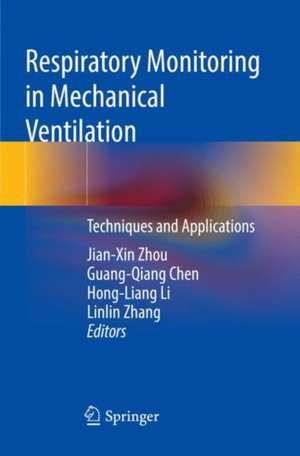Respiratory Monitoring in Mechanical Ventilation: Techniques and Applications
Editat de Jian-Xin Zhou, Guang-Qiang Chen, Hong-Liang Li, Linlin Zhangen Limba Engleză Paperback – 28 ian 2022
Respiratory monitoring encloses a series of physiological and pathophysiological measurements, from basic gas exchange and ventilator wave forms to more sophisticated diaphragm function and lung volume assessments. The progress of respiratory monitoring has always been accompanied by advances in technology. However, how to properly conduct the procedures and correctly interpret the data requires clear definition.
The book introduces respiratory monitoring techniques and data analysis, including gas exchange, respiratory mechanics, thoracic imaging, lung volume measurement, and extra-vascular lung water measurement in the initial part. How to interpret the acquired and derived parameters and to illustrate their clinical applications is presented thoroughly. In the following part, the applications of respiratory monitoring in specific diseases and conditions is introduced, including acute respiratory distress syndrome, obstructive pulmonary diseases, patient-ventilator asynchrony, non-invasive ventilation, brain injury with increased intracranial pressure, ventilator-induced diaphragm dysfunction, and weaning from mechanical ventilation.
This book is intended primarily for ICU physicians and other practitioners including respiratory therapists, ICU nurses and trainees who come into contact with patients under mechanical ventilation. This book also provides guidance for clinical researchers who take part in respiratory and mechanical ventilation researches.
| Toate formatele și edițiile | Preț | Express |
|---|---|---|
| Paperback (1) | 722.37 lei 39-44 zile | |
| Springer Nature Singapore – 28 ian 2022 | 722.37 lei 39-44 zile | |
| Hardback (1) | 1105.57 lei 3-5 săpt. | |
| Springer Nature Singapore – 28 ian 2021 | 1105.57 lei 3-5 săpt. |
Preț: 722.37 lei
Preț vechi: 760.39 lei
-5% Nou
Puncte Express: 1084
Preț estimativ în valută:
138.24€ • 144.14$ • 114.89£
138.24€ • 144.14$ • 114.89£
Carte tipărită la comandă
Livrare economică 17-22 martie
Preluare comenzi: 021 569.72.76
Specificații
ISBN-13: 9789811597725
ISBN-10: 9811597723
Pagini: 308
Ilustrații: VI, 308 p. 67 illus., 40 illus. in color.
Dimensiuni: 155 x 235 mm
Greutate: 0.58 kg
Ediția:1st ed. 2021
Editura: Springer Nature Singapore
Colecția Springer
Locul publicării:Singapore, Singapore
ISBN-10: 9811597723
Pagini: 308
Ilustrații: VI, 308 p. 67 illus., 40 illus. in color.
Dimensiuni: 155 x 235 mm
Greutate: 0.58 kg
Ediția:1st ed. 2021
Editura: Springer Nature Singapore
Colecția Springer
Locul publicării:Singapore, Singapore
Cuprins
Gas exchange.- Respiratory mechanics.- Imaging.- Lung volume measurement.- Extravascular lung water monitoring.- Acute respiratory distress syndrome.- Obstructive pulmonary diseases.- Patient-ventilator asynchrony.- Non-invasive ventilation.- Brain injury with increased intracranial pressure.- Ventilator-induced diaphragm dysfunction.- Weaning from mechanical ventilation.
Notă biografică
Jianxin Zhou is the director and professor of intensive care unit, Beijing Tiantan Hospital, Capital Medical University, Beijing, China.
Guangqiang Chen is associated professor of intensive care unit, Beijing Tiantan Hospital, Capital Medical University, Beijing, China.
Hongliang Li is associated professor of intensive care unit, Beijing Tiantan Hospital, Capital Medical University, Beijing, China.
Linlin Zhang is associated professor of intensive care unit, Beijing Tiantan Hospital, Capital Medical University, Beijing, China.
Textul de pe ultima copertă
This book covers the up-to-date advancement of respiratory monitoring in ventilation support as well as detecting the physiological responses to therapeutic interventions to avoid complications. Mechanical ventilation nowadays remains the cornerstone in life saving in critically ill patients with and without respiratory failure. However, conclusive evidences show that mechanical ventilation can also cause lung damage, specifically, in terms of ventilator-induced lung injury.
Respiratory monitoring encloses a series of physiological and pathophysiological measurements, from basic gas exchange and ventilator wave forms to more sophisticated diaphragm function and lung volume assessments. The progress of respiratory monitoring has always been accompanied by advances in technology. However, how to properly conduct the procedures and correctly interpret the data requires clear definition.
The book introduces respiratory monitoring techniques and data analysis, including gas exchange, respiratory mechanics, thoracic imaging, lung volume measurement, and extra-vascular lung water measurement in the initial part. How to interpret the acquired and derived parameters and to illustrate their clinical applications is presented thoroughly. In the following part, the applications of respiratory monitoring in specific diseases and conditions is introduced, including acute respiratory distress syndrome, obstructive pulmonary diseases, patient-ventilator asynchrony, non-invasive ventilation, brain injury with increased intracranial pressure, ventilator-induced diaphragm dysfunction, and weaning from mechanical ventilation.
This book is intended primarily for ICU physicians and other practitioners including respiratory therapists, ICU nurses and trainees who come into contact with patients under mechanical ventilation. This book also provides guidance for clinical researchers who take part in respiratory and mechanical ventilation researches.
Caracteristici
Covering up-to-date techniques and clinical applications of respiratory monitoring Provides illustrations and case-based practical maneuvers Valuable guide for practitioners and intensive care physicians
